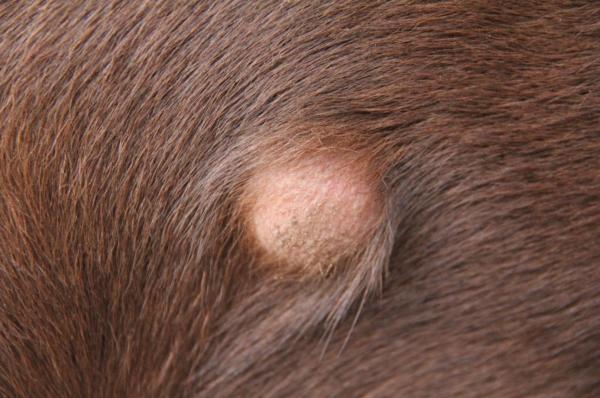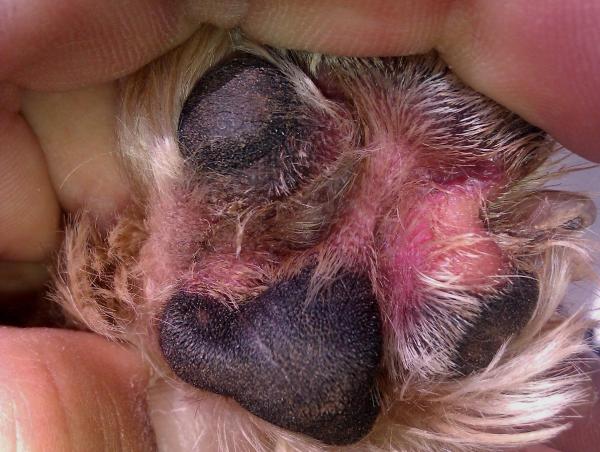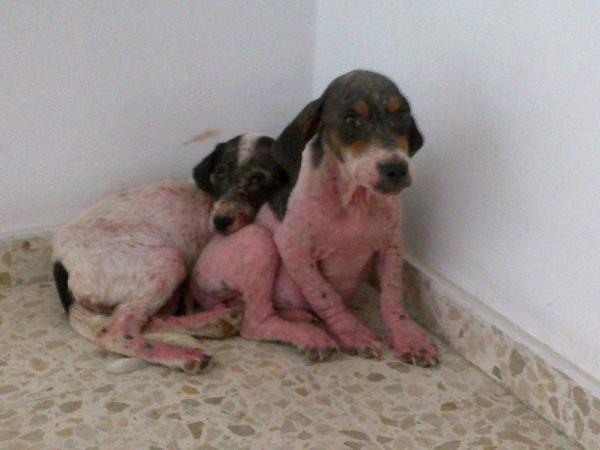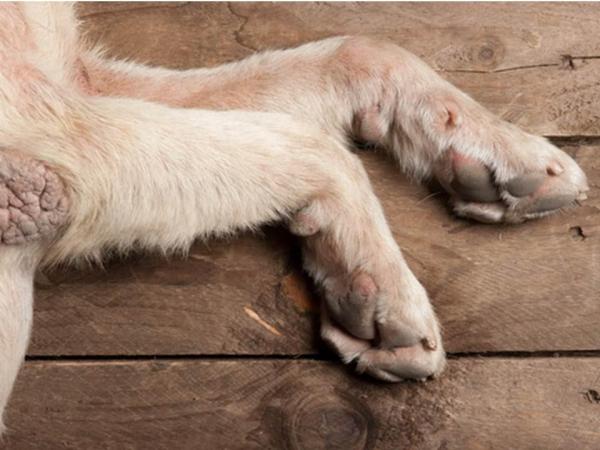
Skin diseases in dogs should be taken very seriously to prevent the problem from getting worse and having irreparable consequences over time. The skin is the organ that insulates the dog's organism from the environment and protects it from infections and viruses. In general, dogs have a layer of fat that protects them. When this fails, however, a number of derived problems can appear.
Stay with us at AnimalWised and learn more about common skin diseases in dogs to detect them earlier and treat them appropriately.
Parasites in dogs
One of the most common causes of a dog's skin becoming inflamed are bites from certain parasites. The presence of fleas and ticks causes inflammation and redness, and the problem is further aggravated by the itch, as it leads to compulsive scratching.
How to treat parasites in dogs:
If you detect external parasites in your dog, you should go to your usual pet shop and purchase the tools available on the market. In the case of fleas, you must use a special comb. Bathe your dog with an anti-parasitic lotion while you comb its hair thoroughly, eliminating all traces of the fleas.
Wash at high temperature all the elements that have had contact with your dog, especially those made of fabric: bed, toys, blankets and so on.
If the situation is beyond you, go to the vet as soon as possible. Asking for an appointment in advance, warning them of the problem.
How to prevent parasites in dogs:
The best system is to combine three basic elements which together will make an effective layer of protection for your dog:
- Anti-parasitic shampoo
- Quality pipette
- Anti-parasite collar
Here you can learn more about removing fleas from dogs and deworming dogs.

Allergies in dogs
Your dog may suffer allergies to an external agent such as pollen or to a given food. Allergies cause itching, skin redness and its dryness. In an attempt to relieve itching, your dog may aggravate the situation and cause injuries through scratching, so you must monitor it closely.
Treating allergies in dogs:
First and foremost, you must find the cause of your dog's allergy. Visit your veterinarian to perform tests and thus avoid further contact with the allergen. The vet will probably recommend a dietary change, as there are high quality hypoallergenic dry feeds for dogs in the market.
If you have trouble identifying the problem and do not know what causes allergic reactions in your dog, you install a camera - like a webcam - to monitor its movements in the garden or in the house. For instance, your dog may be eating a plant that it should not be eating.

Cysts and tumors in dogs
Cysts and tumors are relatively common, especially when it comes to elderly dogs. They can be benign or cancerous. There are breeds with a greater predisposition to developing cysts, especially in the case of pedigree dogs.
Treating cysts and tumors in dogs:
Cysts produce visible inflammation in the skin and are usually darker, depending on where they develop. You should go to the vet as soon as possible because if it is a cancerous tumor the dog will have the chance to heal faster. Depending on the result, the vet will decide in what is the best treatment.
Here you can learn more about skin tumors in dogs.

Fungus in dogs
Fungi appears as the result of the accumulation of yeast in the dog's damp areas, usually the armpits, ears or skin folds. This infestation acquires a circular shape, and we can notice its presence if we find hairless spots, ulcers, discharge, redness or even scales.
Treatment of fungi in dogs:
Bathe your dog in warm water with a specific shampoo with anti-fungal properties. To kill the fungus, it will be enough to apply iodine twice daily.
If the situation is serious or you notice that there is no improvement you should go to the vet immediately to check the type of fungus and they will advise on the appropriate treatment.
Preventing fungi in dogs:
If your dog has suffered a fungal infection it is important that you wash all its objects - bedding, towels, toys - at high temperature to prevent recurrence.
Consult your veterinarian on how best to prevent fungi in your case, but we recommend that whenever you go for a walk and observe sweat on the dog's body you absorb it with a towel, paying special attention to the legs, and that you always dry it thoroughly after a bath.

Scabies in dogs
Scabies appears when there is an infestation of mites in the dog's skin. This is a serious disease that causes inflammation, hair loss and redness of the skin. The consequences of scabies can be mild or very severe, depending on the state of the dog's health.
Treatment of scabies in dogs:
If you suspect that your dog may have scabies you should go immediately to the vet, previously contacting them by phone. Scabies must be treated as soon as possible. The veterinarian will recommend medical treatment, which must be completed without fail every day until the problem is eradicated. Remember that scabies is contagious.

Calluses in dogs
Calluses are a kind of skin problem that commonly affects dogs. They are visually easy to identify because they are dry, bald circular zones on the elbows. Calluses are the result of leaning excessively on hard or rough surfaces, especially in large dogs or those who have sensitive skins.
Treating calluses in dogs:
If you find that your dog has calluses, you should think about putting remedy to this issue as in the long run they can cause ulcers and result in excessive bleeding. If the situation is serious, you should take your dog to the vet to treat its wounds.
If the problem is mild, applying a nourishing olive oil or aloe vera cream every day directly on the callus will be enough. Don't forget to offer your dog a more comfortable bed to rest and sleep.

Some breeds tend to develop specific conditions. If you have a Shar Pei, don't miss our article on the common skin conditions of Shar Pei dogs and how to care for them!
This article is purely informative. AnimalWised does not have the authority to prescribe any veterinary treatment or create a diagnosis. We invite you to take your pet to the veterinarian if they are suffering from any condition or pain.
If you want to read similar articles to Skin Diseases in Dogs, we recommend you visit our Other health problems category.